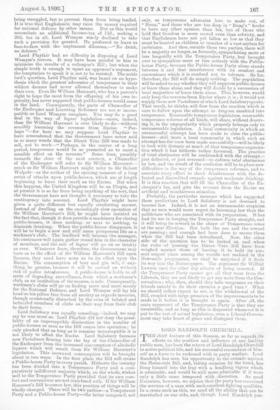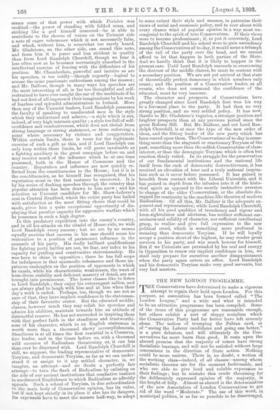LORD RANDOLPH CHURCHILL. T HE chief feature of this Session, so
far as regards its effects on the position and influence of our leading public men, has been the return of Lord Randolph Churchill to active political life, and his successful reassertion of him- self as a force to be reckoned with in party warfare. Lord Randolph has seen his opportunity in the crusade against the Home-rule Bill, and, taking occasion by the hand, has flung himself into the fray with a headlong vigour which is admirable, and would be still more admirable if it were only a little more tempered with discretion. As good Unionists, however, we rejoice that the party has recovered the services of a man with such excellent fighting qualities. In a crisis such as this, we need all the ability that can be marshalled on our side, and, though Lord Randolph pos- sesses none of that power with which Pericles was credited—the power of standing with folded arms, and striking like a god himself unmoved—he is able to contribute to the chorus of voices on the Unionist side a note of eager vehemence which is not necessarily false, and which, without him, is somewhat too rarely heard. Mr: Gladstone, on the other side, can sound this note, and from him it is purer and less strident in quality than from Lord Randolph Churchill, though we hear it less often now as he becomes increasingly absorbed in the intellectual exercise of fencing with the difficulties of his position. Mr. Chamberlain, powerful and incisive as are his speeches, is too coldly—though cogently—logical to arouse the same passionate enthusiasm among the masses ; and Mr. Balfour, though in many ways his speeches are the most interesting of all, is far too thoughtful and self- restrained to have ever caught the ear of the multitude if he had not first of all impressed their imaginations by his work of fearless and splendid administration in Ireland. More than any of the Unionist leaders, Lord Randolph possesses the faculty of speaking to uneducated men in the style which they understand. and admire,—a style which is not, indeed, of very high intrinsic quality ; a style too full of self- confidence and combativeness, which does not shrink from strong language or strong statement, or from enforcing a point where necessary by violence and exaggeration. Within certain limits, there is room for the legitimate exercise of such a gift as this, and if Lord Randolph can only keep within those limits, he will prove invaluable as a fighting auxiliary in the great campaign before us, and may recover much of the influence which he at one time possessed, both in the House of Commons and the country. Reputation and influence are now quickly re- flected from the constituencies to the House ; but it is in the constituencies, as he himself has recognised, that his reputation must in the first instance be recovered. It is by his series of dashing speeches through the country that popular attention has been drawn to him anew ; and his selection as Unionist candidate for Mr. Shaw-Lefevre's seat in Central Bradford, which the entire party has hailed with satisfaction as the most fitting choice that could. be made, gives him a quite exceptional opportunity of dis- playing that peculiar capacity for aggressive warfare which hepossesses in such a high degree. In this predatory expedition into the enemy's country, and in all his attacks on the citadel of Home-rule, we wish Lord Randolph every success; but we are by no means equally anxious that success in his case should mean his restoration to a position of paramount influence in the counsels of his party. His really brilliant qualifications for fighting party battles are not, we fear, any index to his capacity for guiding and constructive statesmanship. He was born to shine in opposition ; there he has full scope for indulgence in that spasmodic vehemence and those im- petuous onslaughts on the position of opponents in which he excels, while his characteristic weaknesses, the want of hum-drum stability and deficient mastery of detail, are not brought into prominence. The lower classes like to listen to Lord Randolph ; they enjoy his extravagant sallies, and are always glad to laugh with him and at him when their day's work is ended. Perhaps, too, though we are not so sure of that, they have implicit confidence in the statesman- ship of their favourite orator. But the educated middle- classes, however much they may relish his speeches and admire his abilities, maintain towards him an attitude of distrustful reserve. He has not succeeded. in inspiring them with that perfect faith in the steadiness and trustworthi- ness of his character, which to an English statesman is worth more than a thousand showy accomplishments. Steadiness is at all times the first essential in a Conserva- tive leader, and in the times before us, with a thousand wild excesses of Radicalism threatening us, it can less than ever be dispensed with. Lord Randolph Churchill is still, we suppose, the leading representative of democratic Toryism, and democratic Toryism, as far as we can under- stand it or assign to it any settled character, is, we imagine, an attempt—and no doubt a perfectly fair attempt—to turn the flank of Radicalism by enlisting on the side of our ancient institutions that combative instinct in uneducated Englishmen to which Radicalism so adroitly appeals. Such a school of Toryism, in due subordination to the main body of Conservative opinion, has its value, but if not kept strictly in its place it also has its dangers. Its exponents have to meet the masses half-way, to adopt to some extent their style and manner, to patronise their views of social and economic policy, and to veer about with every chance wind of popular opinion in a way most un- congenial to the spirit of true Conservatism. If their views were to become predominant; if, to put it concretely, Lord Randolph Churchill and his school were to gain ascendency among the Conservatives of to-day, it would mean a triumph of the tail of the party over the head, and we cannot afford to let that happen in both parties of the State. And we hardly think that it is likely to happen in the present case. Until Lord Randolph succeeds in overcoming the distrust of the middle classes, he must be content with a secondary position. We are not yet arrived at that state of theoretically perfect democracy in which numbers only count ; and the position of a Conservative leader, at all events, who does not command the confidence of the educated, must be very insecure. The character and prospects of Conservatism have greatly changed since Lord Randolph first won his way to a foremost place in the party. It had then no very strong position, and no very settled policy. It has now, thanks to Mr. Gladstone's vagaries, a stronger position and brighter prospects than at any previous period since the great Reform Bill. But Mr. Balfour, and not Lord Ran- dolph Churchill, is at once the type of the new order of ideas, and the fitting leader of the new party which has been reared upon them. The Conservatism of to-day is some- thing more than the stagnant or reactionary. Toryism of the past, something more than the selfish Conservatism of class- interest, or than the demagogic Toryism which is often but reaction thinly veiled. In its struggle for the preservation of our fundamental institutions and the national life itself from the rush of democratic destructiveness, it has received an elevation of tone and a truly national inspira- tion such as it never before possessed. It has gained in breadth from contact with the Liberal Unionists and it has gained in depth from the infusion into it of the histo- rical spirit as opposed to the merely instinctive aversion to change of the older Conservatism, or the absolute dis- regard for continuity in the machine-like theories of modern Radicalism. Of all this, Mr. Balfour is the adequate ex- ponent and representative; while Lord Randolph Churchill, with all his good qualities of trenchancy and vigour and keen-sightedness and alertness, has neither sufficient ear- nestness and solidity of character, nor sufficient intellectual grasp, to realise and give full expression to the new political creed, which is something more profound in meaning than democratic Toryism. If he will loyally accept a position short of the highest, he may render great services to his party, and win much honour for himself. But if we Unionists are persuaded by his zeal and energy in Opposition to renew our implicit confidence in him, we shall only prepare for ourselves another disappointment when the party again enters on office. Lord Randolph and his democratic Toryism make very good servants, but very bad masters.



































 Previous page
Previous page